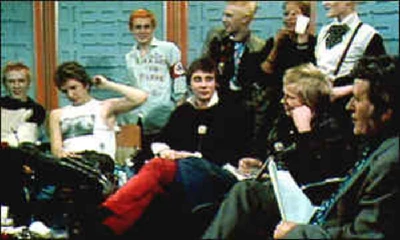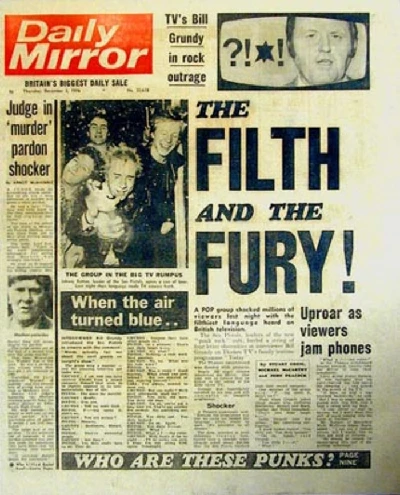Miscellaneous
-
Breakdown
published: 16 /
6 /
2007

In the third and final part of his series on the 70's punk era, Adam Wood looks at the rise into the mainstream of the punk movement, after the Sex Pistols' infamous appearance with Bill Grundy on the 'Today' show and its subsequent decline as a result
Article
The Clash and the Sex Pistols were arguably the most important and iconic of all the punk bands and it was the Sex Pistols’ wrangling with record companies and the Clash’s eventual departure from out and out punk that precipitated the downfall of the movement. These two bands define the inherent shortcomings of punk and why, despite its political posturing, it was unable to move from a small, outsider community into the fully fledged revolutionary movement some of the Blank Generation wanted.
The lynchpin of the Sex Pistols was Johnny Rotten. Rotten was not the real John Lydon, He was a caricature whose vile attitude and appearance was a signifier dramatising what had come to be called Britain’s decline. Johnny Rotten acted out cartoon anarchy, a larger than life character that spat bile at the establishment and at his audiences to the extent that filmmaker Julien Temple described one gig as “Absurd anarchist theatre.” To many it was clear that Johnny Rotten represented an anarchic threat or political hope, but, however, this does not equate to Rotten being a revolutionary leader. Rather, as Temple points out, it is theatricality in its extreme, a signifier of potential revolution not revolution itself.
Unlike mad caricatures such as Charlie Chaplin though, Rotten is an anti-hero, something too hate filled and repellent to be venerated, the revolution that Rotten represented was one within the realms of art, not directly applicable to wider society. Rotten himself says that he is an “Icon breaker, therefore that makes me unbearable… the audience wants you to carry their ideological load for them.” At the height of the Sex Pistols’ infamy in the summer of 1977, the 'NME' determined that Rotten was trying to “Breakdown the star system.” Rotten was an antithesis to the modern rockstar, a signifier of changing times whose anarchy represented an ideological parting from contemporary rock. He was not intended to be an anarchist idol like Durutti; siding with Rotten was to show contempt of British society, not necessarily a will to destroy it.
The Sex Pistols’ anger was essentially directionless, when Rotten sang “I am an anarchist/Don’t know what I want but I know how to get it/I wanna destroy the passer-by,” he envisaged lashing out selfishly and randomly, without even having a clear purpose, more selfish nihilism than anarchy.
While the Sex Pistols applied a more individualist rejection of contemporary society, the Clash embraced a more conventional and politically leftist approach to perceived problems in British society, hoping for change rather than destruction. Comparing the Pistols’ 'Anarchy in the UK' with 'White Riot', “Are you taking over?/Or are you taking orders?/Are you going forwards?/Or are you going backwards?” shows a clear difference in the approach of the two bands. This line is by no means selfish; it is a rousing, questioning call for change, rejecting apathy and aimless anger.
The Clash’s 'White Man in Hammersmith Palais' also attempts to encourage the audience to stop petty squabbling and turn their energies into creating a positive change: “White youth, black youth/Better find another solution/Why not phone up Robin Hood/And ask him for some wealth redistribution.” To the Clash, many of Britain’s poor were still waiting for some mythical figure to arrive and liberate them instead of getting up and changing things themselves. Where the Sex Pistols could only offer an nihilism, the Clash tried to energise a generation into doing something to change Britain.
The Clash and the Sex Pistols both sang in a kind of coarse cockney accent, a ‘real’ accent that offers down to earth truth. Rather than a quaint Dick Van Dyke type of speech, Rotten’s sneering style turned a comical and friendly accent into a more sinister and threatening voice, the accent becomes subverted, a reflection of the dangers of inner city life. Joe Strummer’s voice drew its connotations from the football terraces and dockyards, in order to show solidarity with ordinary working people. Rather than sing in such a way as to imitate Americans like Led Zeppelin, punk bands chose to sing in a native tongue, both rejecting a rock star cliché and giving their sound a peculiarly British twist.
Initially, major record labels were genuinely frightened by the prospect of punk, having not had to deal with so explosive a new movement in popular culture since the birth of rock and roll itself. Maurice Oberstein, former Managing Director of CBS Records (who later signed the Clash) recalled: “There was a level of hysteria within the music industry, that this is a music we shouldn’t be involved in.” It, however, was simply a matter of time before major labels found a way to market the rejectionist attitude of punk, and thus control it, as the Clash put it “Ha! you think its funny/Turning rebellion into money.” One of the biggest coups for the industry was when the monolithic EMI signed the Sex Pistols. On announcing the signing a spokesman declared “Here at last is a group with a bit of guts for younger people to identify with.”
The group’s tenure with EMI was short lived, lasting less than three months, primarily due to the group’s appearance on ITV’s 'Today' programme, hosted by Bill Grundy. A drunk Grundy (Rotten later described him as a “fat sexist beer monster”) goaded the band after they reacted to him asking Siouxsie Sioux to “Meet afterwards” with him. Guitarist Steve Jones retaliated to this by calling Grundy a “Dirty Bastard,” and then all hell broke loose:
Bill Grundy : Well, keep going chief, keep going. Go on, you’ve got another five seconds. Say something outrageous.
Steve Jones : You dirty fucker!
Bill Grundy : What a clever boy.
Steve Jones : What a fucking rotter.
This cemented the poor reputation of the Sex Pistols across the country, especially as the programme was one of ITV’s teatime viewing shows. Simon Frith wrote that “The effect of fitting rock and roll into a medium like television is to make it safe, to deprive it of its significance – an undifferentiated audience can’t be a rock audience.” In effect, EMI were attempting to sanitise the Sex Pistols, to portray them as ‘jack-the-lads’ and instead they got angry and offensive young men, unimpressed by television a rejection that was anarchy in itself.
It led to outrage the next day from almost every newspaper; the Daily Mirror even reported the story of a 47-year-old truck driver who kicked his television after becoming furious that his eight year old son heard the swearing. He said that “I was so angry and disgusted with this filth that I took a swing with my boot.” That a grown man responded to the words ‘fucking rotter’ by violently destroying his television set in front of his eight year old son says much about the violence inherent in 1970's Britain. The child would surely be more frightened and alarmed in seeing such a reaction from such little provocation than from a swearword, regardless of the restrictive nature of television at the time.
From this moment on punk became a media pariah, the daily newspapers on the one hand attacking punk as degenerate and dangerous, on the other as Johnny Rotten put it “Revelling in ‘how to be a punk’ articles. They’d have a centrefold of these boring kids that they would pick off the street and dress them up as they thought punks were.” So while punk was vilified it was also being accepted, inadvertently acting out Dick Hebdige’s theory of subculture moving “through a cycle of resistance and defusion being simultaneously rendered explicable and meaningless.”
So while the Clash encouraged agitation in the sense that it was for the audience to try and improve their lot, the Sex Pistols offered destruction. The zenith of the Sex Pistols as national hate figures came with the release of 'God Save the Queen', on the record shelves just in time for the Silver Jubilee. The result of the release of this record was that Johnny Rotten was attacked by a razor blade wielding assailant and Steve Jones was beaten by six men with an iron bar and needed fifteen stitches in his head. As fervent monarchists sought to direct their anger toward the Sex Pistols it became apparent that punk, for all its political posturing, was still a community for the outsider and for the rejected members of society as it was when it first developed.
When big punks signed to big labels, (the Adverts to RCA, the Clash to CBS, the Sex Pistols, the Buzzcocks, X-Ray Spex, and Wire to EMI or subsidiaries), punk went national and global. The result was that it lost control over its own future. Punk was no longer the flowers in your dustbin. It was a product. As punk became a product it became marketed on a mass scale to a public that had initially negated the original founders of the subculture, as a result it lost its impetus.
Punk could not survive in its original incarnation simply because it was a unique subculture that arose at a specific point in time. It was a youth culture so it was inevitable that first manifestation of punk had a limited time span. Lester Bangs found that “Contrary to almost all reports published everywhere; I found that British punks everywhere I went to be basically if not manifestly gentle people.” Bangs discovered that the mass of the Blank Generation were not of an aggressive or even revolutionary mindset. There was simply no way that this community could lead a rebellion even if it desired to do so. Even Joe Strummer, said: “In fact punk rock means exemplary manners to your fellow human beings.” Punk was inextricably linked to the environment that allowed its creation, though not with a desire to join this politically charged situation. As Mick Farren put it “The punks seem altogether too militant in their directionless-ness to fall for any kind of conventional political pitch, no matter how extreme.”
The Blank Generation mostly came from the young working class, who have by their very nature a marginal social status. Young people feel like outsiders and feel different to conventional society. The lack of job opportunities for youth in the mid to late 1970's meant many left school with no future, feeling rejected by society. Punk was a counter to this problem. It offered job opportunity for the artistically inclined and it offered a passive rejection of society through music and style. It was an outlet for frustration, a community in itself and created endless openings due to its utilisation of Dadaism. Punk was not a revolutionary movement in a political sense; though it managed to break barriers in art and life it clearly did not have the potential for large scale uprisings and could not respond to violence directed against its leaders. Punk was about liberation and freedom from the norm but had no political desire to overthrow society and start again; it was an outsider culture that was assimilated into the mainstream where it began to collapse.
Picture Gallery:-
